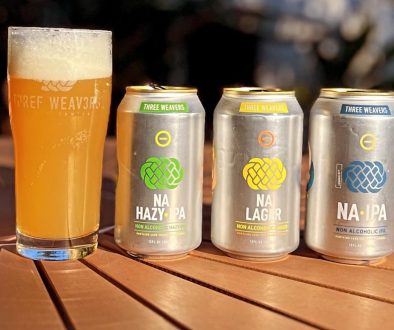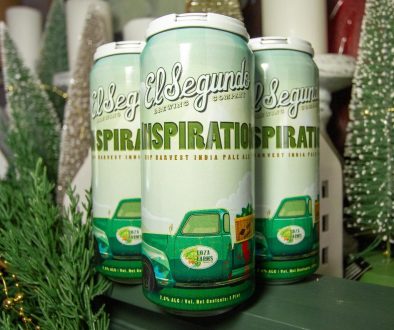Craft Brewing on Easy Mode: Wicked Weed Brewing & AB-InBev
Beer is business. Let’s get that out of the way right now. This past week, the business of beer flared up into the mainstream in a big way when Wicked Weed Brewing of Asheville, North Carolina announced they’d reached a deal with AB-InBev (ABI), the world’s largest international beer conglomerate. The reaction to the buyout was swift, hot, and intense.
Why was reaction to this acquisition so much more intense when ABI purchased nine American craft breweries prior to Wicked Weed? While people say a lot of the same things regardless of the target of the acquisition, the ferocity of backlash to this acquisition eclipses all the previous announcements since Goose Island’s purchase in 2011. Goose Island was the first purchase in their modern campaign against “Craft Beer.” The industry response was vociferous and national.
Since Goose Island, the response has varied from tepid to mildly annoyed to heart broken, but it’s been contained largely to the region of the brewery’s distribution. With certain breweries, commenters weren’t surprised since they felt the brewery was built to sell. With other breweries, commenters felt they were losing a part of their regional community. With Wicked Weed, people feel like they’ve lost a flag bearer of the modern Craft Beer Revolution—a nationally-known industry darling.
Why do people feel so intensely about a business doing what businesses do? Craft beer was the reaction to the faceless homogenization of big business beer. It rose out of a nationwide sea of bland, lowest common denominator adjunct lager. It wasn’t just the flavor that captured people’s imaginations, it was the sense of community. In the earliest days, people who chose to try these new craft beers often got a chance to see the brewer or owner and know that they were part of their community. Consumers may have known the name Augustus Busch and the history of his brewery because of the pervasive marketing, but he existed more as a character in a commercial than a real flesh and blood person.
Getting to see Ken Grossman (Sierra Nevada),Jim Koch (Boston Brewing),Sam Calagione (Dogfish Head),Kim Jordan (New Belgium), or any of America’s Craft Beer Heroes down at the bar and geeking out with them about their creations was part of the allure and fun of craft beer. Consumers got to support companies they believed in while getting a product that was tasty and set them apart from the mainstream. Drinkers got to be part of an industry of comradery.
READ: Beachwood Brewing Issues Statement on ABI Owned TheBeerNecessities.com
Craft brewers fought an uphill battle and enlisted each other’s help in getting ideas, collaboration, equipment, and business support. Brewers frankensteined breweries out of old dairy equipment and anything else they could scavenge into a functional system. Hearing about the struggle and the story in the brewer’s/owner’s own words was part of the attraction of drinking craft beer and drinkers of craft beer got to be part of that struggle. By buying beer and supporting the brewery, consumers took ownership in that business and to them, it became more than just a business; it became part of their identity in the craft beer community.
And that’s why it’s so disingenuous to to chalk it up as “just business” when something like AB-InBev’s purchase of Wicked Weed takes place. For AB-InBev, it is just business. It’s a long term strategy to combat the loss of market share for their portfolio of international adjunct lagers. The success of craft beer over the last 40 years has directly impacted their bottom line and forced them to adopt a new strategy. Several of the reaction pieces talked about the resources of ABI and how they could simply start their own craft-type breweries and enter the market and community that way, but what was only hinted at was the fact that craft beer isn’t what ABI is trying to brew—it’s credibility.
That’s why they bought Goose Island, Elysian, and now Wicked Weed. That’s why they’ve created their new division, called The High End, to promote, manage, and sell these products. Those breweries have spent their time earning their stripes in the Craft Beer Business and building credibility with their customers. When ABI spends vast sums of money expanding Goose Island’s barrel capacity to produce Bourbon County Stout, it’s not to impact share prices of a multinational mega-conglomerate; it’s about earning respect in the craft beer community. When they take over Wicked Weed, they add a niche brewery of award-winning IPAs with a large sour production capacity. This excellent diversification of ABI’s portfolio adds further options in the most popular craft beer category, IPA, while also adding options in the up and coming specialty sour category. On the surface, and in truth, this is excellent for ABI and Wicked Weed.
No one can deny that Wicked Weed will grow and its founders have achieved what is viewed as a standard marker for success in American Business: they built a business of value that attracted a powerful buyer. No one can deny this is a great acquisition for ABI. It’s also undeniable that this is bad for the craft beer industry as a whole. And this is why the community’s response was so intense with over half of the breweries scheduled to participate in Wicked Weed’s upcoming Funkatorium Invitational beer festival dropping out.
Jester King Brewery’s Jeffery Stuffing summarized his brewery’s stance in a short press release on their blog (Available here). It’s clear his feelings are mixed. He’s happy for his friend and doesn’t doubt the quality of the beer won’t change, but the business principles of selling to ABI are too much to overcome: “One of our core principles is that we do not sell beer from AB In-Bev or its affiliates. We’ve chosen this stance, not because of the quality of the beer, but because a portion of the money made off of selling it is used to oppose the interests of craft brewers. In Texas, large brewers (and their distributors) routinely oppose law changes that would help small, independent brewers. We choose not to support these large brewers because of their political stances, and in some cases, their economic practices as well.”
This is why ABI’s purchase of craft breweries is so insidious. ABI’s number one priority is to its profits and shareholders. They have no interest in being part of the craft brewing community because they believe in it; they want to be part of it because it’s eating their sales. They know they can’t really infiltrate it with house brands like Shock Top because it lacks the credibility of an actual craft brewery. It can take up space on a shelf and counter MolsonCoors’ Blue Moon, but it can’t bring the credibility of a Wicked Weed. And this credibility is what ABI wants and will use against the craft beer community that Wicked Weed was so recently proudly part of. And while ABI is using Wicked Weed against the craft beer community, Wicked Weed will use ABI’s resources to set their difficulty level to “easy mode.” Men’s Journal interviewed Walt Dickinson, one of the erstwhile owners of Wicked Weed Brewing (you can read the whole thing here). Dickinson, in his own words, explains how:
“Wicked Weed has always been limited by access to raw materials. Pernicious, and Napoleon Complex, and Freak of Nature, and Lt. Dank—those are all really hop-forward beers, using upwards of four pounds per barrel of hops. And those are hard to get your hands on, and that’s why they’re great and why they’ve won medals. So for us, having hops no longer being a limited factor of growth is exciting for us,” explains Dickinson. Every brewery has had hop shortages forcing them to change the mix in their leading IPAs. And now every time those brewers see their friends from Wicked Weed, they’ll look at them knowing who now has those hops. When consumers wonder why their favorite IPA stopped production but they can get a Pernicious, they’ll understand how accurate that name really is.
When a brewery is struggling to find financing, space, or equipment to expand capacity, Dickinson and Wicked Weed can just outsource it to the nearest ABI plant: “If we choose to outsource Pernicious to their facilities…that’s a choice we’ll make.”
Every time a craft brewer loses a good selling placement at a chain account where the corporate buyer is affiliated with ABI and a series of distant ABI brands get multiple placements, they’ll remember when Walt said this: “We’re growing the market, we’re not stealing it from other people.” Wicked Weed won’t struggle with distribution like independent craft breweries will. They’ll have access to the ABI network. When ABI takes over a wholesaler, it won’t be Wicked Weed that is forced find a new wholesaler. When ABI incents their other wholesalers to focus on its brands, it won’t be Wicked Weed that’s deprioritized. “In the end, I think we have an opportunity to challenge the supply chain, how wholesalers treat craft breweries and how the beer is handled,” comments Dickinson.
When a brewery loses tap handles and sees ABI’s The High End brands taking them, will it be because of fair play or because ABI broke the law and paid for business (See Boston Globe’s piece about ABI illegally spending up to $1,000,000 dollars to secure business in Massachusetts). Dickinson is right, when Wicked Weed works with its wholesaler network, they’ll have the ominous presence of ABI standing right behind them.
That’s the crux of the situation. Wicked Weed has exchanged the struggle of being an independent craft brewery for the hugely powerful resources of the world’s biggest beer conglomerate. Every time a brewer struggles to put together the capital to buy barrels or foeders and hopes the price won’t climb out of their reach, they’ll know Walt Dickinson and Wicked Weed can get pretty much whatever they want as they need it. When a brewery is running low on kegs and they’re having trouble sourcing them, Wicked Weed has access to ABI’s keg fleet and purchasing power. Every brewery that’s struggled to create a successful tap room will have to compete against the new ABI funded The High End branded brewpub that just moved to town.
“Everybody’s growing really quickly, too, so we had to make some decisions as to how we were going to grow,” explains Walt Dickinson. When Wicked Weed came to the fork in the road, instead of choosing the path less traveled, they chose to take the massive 8-lane highway owned and operated by ABI. They’ve chosen to exempt themselves from the struggles of the modern craft beer industry to focus on the brewing and interfacing with the drinking public. And that’s what ABI really wants. They want their High End properties to steer the conversation away from ABI’s business practices and the big picture and towards the small conversations. “It’s just business.” “Who cares if the beer is still good.” “It’s just beer.” “They provide good jobs.” They want to turn craft consumers’ antipathy into ambivalence and apathy and harvest those feelings for profit.
Christopher Barnes is a 16 year veteran of the craft beer and cider industry in Oregon. While Oregon is home to some of the best Craft Beers in the US, Christopher spends his time working with and drinking the beer and ciders of Europe. When he’s not working with great beers, he’s writing about them or traveling the globe to taste them. He mainly focuses on the beers and ciders of Europe and industry topics and has written for many sites and publications from around the world. You can find his writing on his site: ithinkaboutbeer.com or follow him on Twitter or Facebook. He lives in Portland, Oregon with his Girlfriend, a 5-year old hooligan, and 2 jerk face cats.





2018 CRAFT BEER PREDICTIONS - DraughtPicks.com
December 22, 2017 @ 10:11 am
[…] High End Craft Invasion – Speculation would have it that after the backlash of the Wicked Weed sale, that ABI would slow down on their High End M&A model of purchasing medium sized breweries. I […]
Good Ideas Executed Poorly: The Brewers Association Chases Independence • thefullpint.com
June 29, 2017 @ 7:22 am
[…] the two-million barrel cap. The timing of the logo release, less than two months after the much publicized Wicked Weed Brewing buyout by AB-Inbev, feels reactionary. The nature and timing of these changes have contributed to the erosion in […]